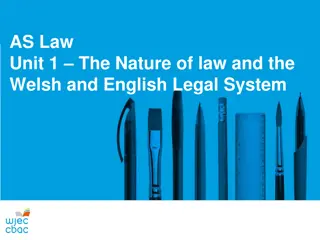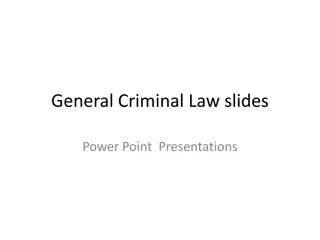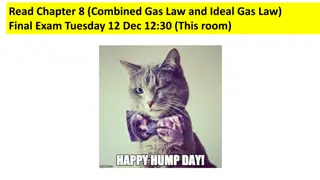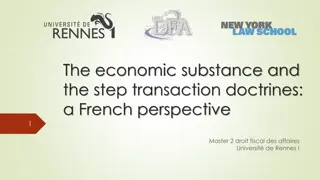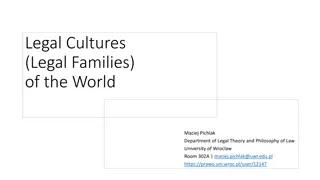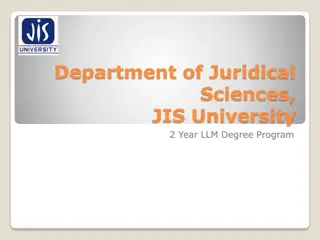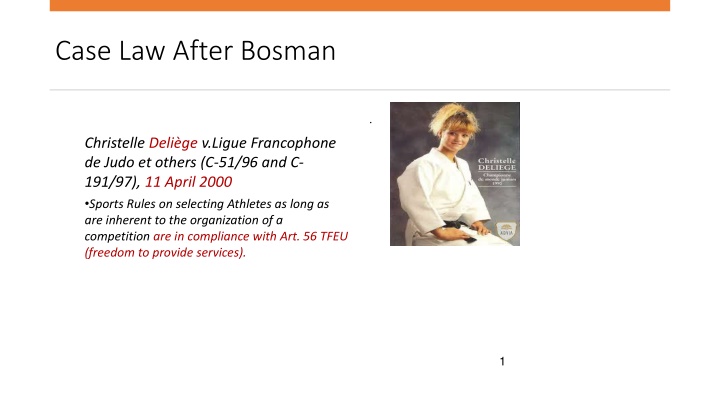
Sports Competition Rules Post-Bosman: EU Law & Anti-Trust Considerations
Dive into post-Bosman case law involving sports rules on athlete selection, transfer windows, and EU law principles on sport as an economic activity. Explore the implications of sports associations being classified as undertakings, and assess the compatibility of sports rules with EU anti-trust regulations.
Download Presentation

Please find below an Image/Link to download the presentation.
The content on the website is provided AS IS for your information and personal use only. It may not be sold, licensed, or shared on other websites without obtaining consent from the author. If you encounter any issues during the download, it is possible that the publisher has removed the file from their server.
You are allowed to download the files provided on this website for personal or commercial use, subject to the condition that they are used lawfully. All files are the property of their respective owners.
The content on the website is provided AS IS for your information and personal use only. It may not be sold, licensed, or shared on other websites without obtaining consent from the author.
E N D
Presentation Transcript
Case Law After Bosman . Christelle Deli ge v.Ligue Francophone de Judo et others (C-51/96 and C- 191/97), 11 April 2000 Sports Rules on selecting Athletes as long as are inherent to the organization of a competition are in compliance with Art. 56 TFEU (freedom to provide services). 1
Case Law After Bosman Jury Lehtonen and others v. F d ration Royale Belge des Soci t s de Basketball (C-176/96), Judgement of 13 April 2000 Transfer windows may be an obstacle to the freedom of movement but They can be justified in view of preserving the integrity of sports competition 2
Basic Principles of Union Law EU law applies to Sport in so far it constitutes an economic activity (ECJ case law) No Activities purely social, artistic or sporting ...... but then MECA MEDICA judgement of 18 July 2006... Test of Necessity Test of Proportionality 3
MECA MEDINA MECA MEDINA MADJEN MADJEN Case C-519/04 P (18 July 2006) 4
Sports track FINA Sanction (4 years Ban) CAS sanction ( 2 years Ban) Ordinary EU Track EU Commission (no competent) General (no competent) Court of Justice (competent) DOPING: Two swimmers tested positive Court 5
1. Is the sports association that adopted the rule in question an undertaking or an association of undertakings ? a. YES to the extent they carry out an economic activity (e.g., the selling of broadcasting rights). If no economic activity, EU competition law does not apply Is trade between MS affected (geographical market, production market, Community interest...)? The Legal Methodology -EU Competition Law: Step 1 6
No assessment in abstract. Account must be taken of a: the overall context in which the decision of the association of undertakings was taken or produces its effects. Its objectives: measures inherent in the pursuit of those objectives and proportionate to them. Proportionality of measures (quid sportive sanctions?) Step 2 7
Can the rule be considered compatible with EU anti-trust rules because it fulfils the conditions of Article 101(3) TFEU or because of an objective justification under Article 102 TFEU? Case by case approach No General sports exception! Step 3 8
No assessment in abstract. Are Sporting Rules (doping) subject to EU Account must be taken of a: the overall context in which the decision of the association of undertakings was taken or produces its effects. Its objectives: measures inherent in the pursuit of those objectives and proportionate to them. Proportionality of measures (quid sportive sanctions?) Law ? 9
IOC = association of undertakings (NOCS) FINDING OF THE OVERALL CONTEXT : Doping rules have a legitimate objective (fight against doping fair play protection of the athletes health) COURT NEVERTHELESS sanctions must be proportionate to the (sports) offence committed 10
Specificity of Sport All rules on authorizations of third-party events must be based on objective, transparent,non discriminatory criteria Sanctions must be proportionate (MECA Medina test). NO BLANKET EXEMPTION from EU competition law 11
The 4.1. SPECIFICITY OF SPORT White Paper on Sport (2007) Sport activity is subject to the application of EU law. At the same time, sport has certain specific characteristics, which are often referred to as the "specificity of sport"
4.1. Organizazion of Sport The political debate on sport in Europe often attributes considerable importance to the so-called "European Sport Model". The Commission considers that certain values and traditions of European sport should be promoted. In view of the diversity and complexities of European sport structures it considers, however, that it is unrealistic to try to define a unified model of organisation of sport in Europe. The White Paper on Sport (2007) Moreover, economic and social developments that are common to the majority of the Member States (increasing commercialisation, challenges to public spending, increasing numbers of participants and stagnation in the number of voluntary workers) have resulted in new challenges for the organisation of sport in Europe. 13
ART. 6 TFEU (2007) entry into force (2009) The Union shall have competence to carry out actions to support, coordinate or supplement the actions of the Member States. The areas of such action shall, at European level, be: - (e) education, vocational training, youth and sport.
ART. 165 TFEU (2007)entry into force (2009) The Union shall contribute to the promotion of European sporting issues while taking account of its specific nature, its structures based on voluntary activity and its social and educational function . (art. 165 TFEU, para. 1) Union Action shall be aimed at : developing the European dimension in sport, by promoting fairness and openness in sporting competitions and cooperation between bodies responsible for sports, and by protecting the physical and moral integrity of sportsmen and sportswomen, especially the youngest sportsmen and sportswomen. (art. 165 TFEU, para. 2) (Some ideas: the Erasmus Sports Programme ) https://www.youtube.com/watch?v=AJ_cujtx1Dw European Parliament : 10 October 2010 15






